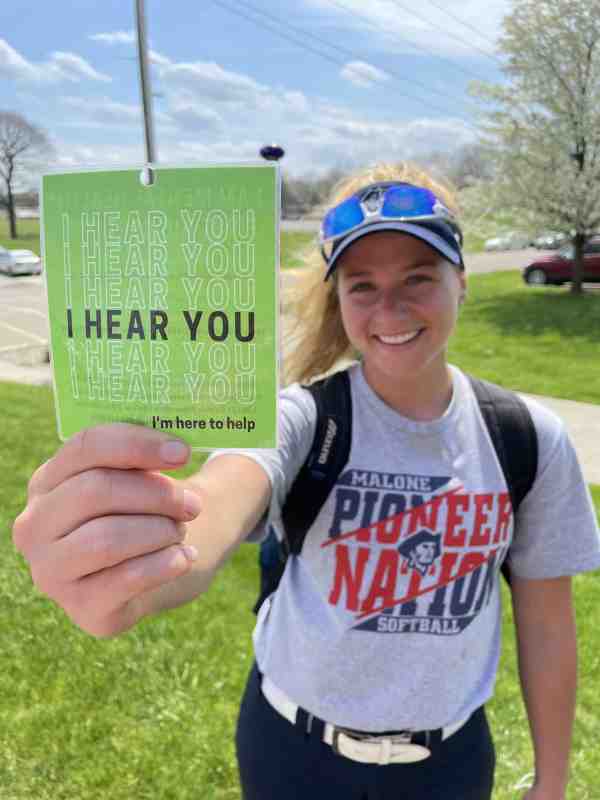Lauren Bennett '22 Professional Education
Lauren Bennett ‘22 started her college career as an Early Childhood Education major. As she grew  throughout her Malone experience, she learned a few things about herself.
throughout her Malone experience, she learned a few things about herself.
“My junior year I realized that I didn’t want to be in education, so I wanted to explore other options,” said Bennett. “This past summer I catered for the Enshrinees' Gold Jacket Dinner at the Pro Football Hall of Fame, and made connections. I found that I really love using my people skills in order to learn about and connect with others.”
Unafraid to take matters into her own hands, she made a tough decision and took a leap.
“I went to the education office and told them I wanted to look into business. They told me that I was only one semester away from graduation. But I knew what I wanted to do,” said Bennett.
Later on, in November of her senior year, Bennett was still unafraid to take chances and do what she felt called to do.
“In November I had the opportunity through the Student Athlete Advisory Committee (SAAC) to go to a leadership conference, and the focus of the conference was mental health in leadership,” said Bennett. “There were different stories that were told, and one that really stuck with me was called the Green Bandana project out of the University of Wisconsin Madison.”
The Green Bandana project seeks to enable students to become QPR (question, persuade, refer) certified in order to promote mental health awareness and suicide prevention.
“I also knew our counseling resources were, and are, overworked and I didn’t want to overwhelm them with more referrals,” said Bennett.
Bennett felt called to create a program to equip Malone community members with the skills to recognize and assist in mental health crises. Fearlessly taking a leap late in her college career, Bennett waded into unknown waters and got to work.
“Over Thanksgiving break I researched about different certifications and health groups, and determined that Mental Health First Aid certification was the best fit for Malone because it teaches students how to deal with a crisis by providing an action plan,” said Bennett.“This certification teaches about the majority of mental health issues in young adults, how to identify warning signs, and how to talk to that person and relate to them. I thought that this could help Malone by not only teaching students how to interact with a crisis situation, but also how to combat the stigma around mental health.”
Just identifying a program wasn’t enough for Bennett however. She wanted to get as many people certified as possible.
“The certifications are usually $90, so I was looking into the classes to make sure it was worth it. After connecting with a virtual class, I told them about what I wanted to accomplish at Malone, so they put me in contact with one of their partners,” said Bennett. “That connection helped us gain a sponsorship from CHI Memorial Hospital in Tennessee, making the certification free for our students.”
With all the pieces in place, the I Hear You project started strong and kept rolling.
“We are now up to 25 people certified - a mixture of athletes, student leaders, and staff. We’re starting with major leadership groups, but ultimately anyone can get certified,” said Bennett.
Even with the project’s initial success, Bennett recognizes its limitations and is planning ahead to make sure students are getting the help that they need.
“We have a partnership with the counseling department, so that people know they can reach out to them if they need help. We don’t want people to get certified and think that they are the end-all-be-all, they still need to take care of themselves,” said Bennett. “And at the end of the day we are not qualified to be diagnosing anyone, nor should we be, so the counseling department is a great resource for our students and the project as a whole.”
While spearheading the project was a solo endeavor, Bennett also credits the Malone community and its members for the success of the project.
“The most special thing about Malone is our community and the way we lean on each other. Carrying each other's burdens and loving one another is what we’re all about,” said Bennett. “Everyone is so willing to help each other, even though mental health can be difficult to hear and learn about. The project could have flopped if no one grabbed on to it, but everyone wanted to help each other - Malone people are all about one another.”
Bennett envisions the project carrying on long after she graduates from Malone, and she also hopes that everyone, from those helping to those being helped, benefit.
“One of the things that enabled me to care so passionately about this project is being open myself about my own struggles with mental health. So many people don’t acknowledge that they have a mental health struggle, and it is so beneficial to help and heal,” said Bennett. “Even if someone doesn’t encounter a single mental health crisis after they’ve been certified they’ve still learned and grown as a person. That’s a ripple effect that will extend far beyond just Malone.”
